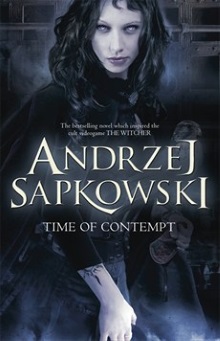
This would be the fourth of Andrzej Sapkowski’s Witcher books I’ve read so far and the second novel of the series. While I’ve liked all three of the previous books I’ve read, I have mixed feelings about this one. I complained about how it feels like nothing much seems to happen in Blood of Elves and it’s doubly true here. The book is decently long but covers only a very short span of time as it covers every scene in excruciating detail.
While Geralt works to discover who is trying to find Ciri and does what he can to frustrate their efforts, Yennefer takes Ciri out of the Temple in Ellander. She decides that Ciri needs to learn to use her magical abilities and wants to enroll her in the academy at Thanedd Island. After a short adventure while out on an excursion, Ciri hears about Geralt being present in a nearby village and wishing to see him again makes an escape. She briefly encounters the Wild Hunt but Yennefer close behind her manages to drive them off. The three of them have a reunion together and set off to Thanedd Island. The Conclave of Mages is also holding a meeting on the island at the time with all of the kings being suspiciously absent. The rulers of the Northern Kingdoms wish to instigate a war against Nilfgaard but are not aware that the Emperor Emhyr is aware of their plans and has preempted them. The conclave turns violent as there are mages acting on Emhyr’s behalf as well as those acting for the Northern Kingdoms. Also present is Dijkstra, spymaster for Redania.
This novel introduces many new characters, many of them mages. Many events take place but much of it is intrigue on the part of the kings and the Emperor Emhyr that we hear about only indirectly. Even many important confrontations and fights take place off camera, such as Philippa Eilhart’s coup against the Chapter and King Demavend’s initial attack against Nilfgaard, and we only hear about as they are related second-hand. It makes it hard to keep track of everything that is going on and feel their import. I also dislike how the novel often switches viewpoints to characters who aren’t that important such as the lawyers Geralt hires to find out information on who is hunting Ciri and the poor royal messenger delivering secret missives between the kings. While it’s great to see more of the world revealed through the eyes of fresh characters, it’s hard to care much about them especially as the characters who we do care about get so little screen time.
Geralt shows up here and there but this is mainly Ciri’s story. Her excursion, complete with a fight against a wyvern, makes for a fun read but at the same time, there’s a frustrating sense that it’s disconnected from the events that matter that are happening out in the world. I really don’t like the ending at all which has Ciri on her own, surviving and trying to find her own way in the world while the entire world searches for her. As for the prose while I still enjoy how it evokes a faintly Eastern European vibe, I’m annoyed by how forced the imagery and verbiage feels this time around. It’s unbelievable how frequently the novel uses the word ‘contempt’ because, yes, it’s the title of the book.
Reading this book, it struck me how much more polished the writing in the two collections of short stories felt. That is of course because they were written later even though I read them first as they are set earlier than the novels. Knowing what I already know about how the story eventually turns out from the games, I’m even more frustrated by how little Ciri’s adventures matter in the grand scheme of things as I can tell that the next book will be about her gallivanting about with a new group of friends. Meanwhile the main plot inches ever so slowly on. At this point I’m not even sure that I’m interested enough to want to read the next book.